A peaceable kingdom: Snorts, grunts and tranquility for a Havana pig farmer
As I drove to Havana along the verdant and winding Gadsden County roads, I firmly promised myself I would not use the word, “Babe” in this article. I was not going to go near Orwell’s "Animal Farm" analogies, nor Wilbur in "Charlotte’s Web." My visit to a pig farm would be all about animal husbandry — and that’s all.
On the other hand, have you ever met a pig up close?
To visit Lorri Kelly’s 11-acre Hurricane Creek Farms, a mostly wooded spread divided between fenced areas, open plots, covered shelters, with her own house squarely in the middle, is to walk into what appears to be a leafy playground for nursery school students.
Farmers markets : The definitive guide to Tallahassee farmers markets and locally grown produce
Oyster restaurants: A half-dozen pearls: Crack open the best restaurants to get oysters in Tallahassee
Thrifty shopping: Find your frugal: Six tips to save money, support locals at the farmers market
The “students,” all charcoal-colored and happier on four feet than two, playfully nudged each other until they toppled over, squabbled with dramatic, but short-lived squeals.
They threw themselves into soft dirt where they wriggled until another came to join them in a good squirm, and nosed apparently fascinating and ubiquitous black spheres around the playground — until a passing duck would come to take over the crunchy nugget.
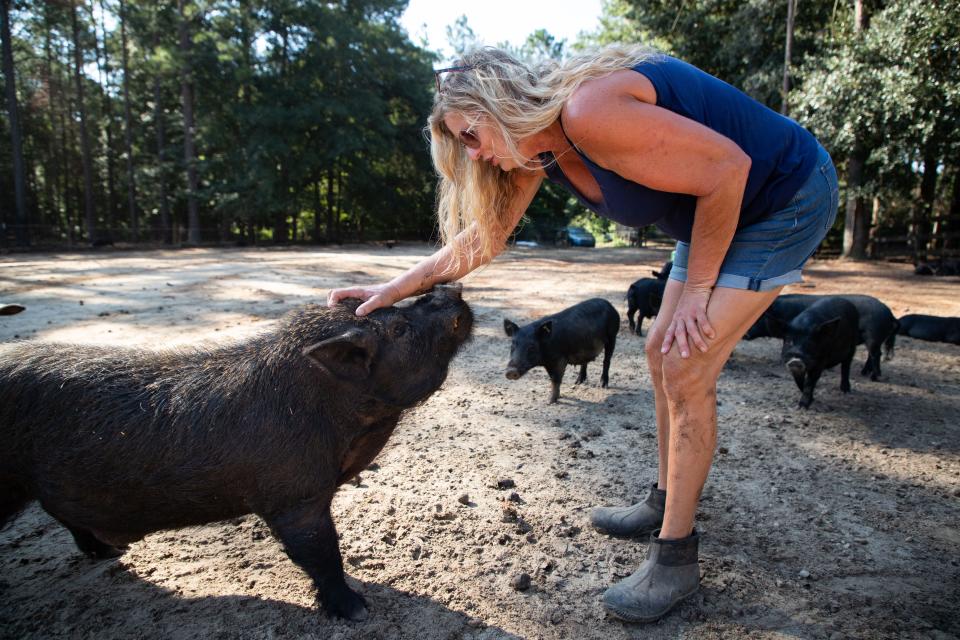
Guinea hogs and Turkish dogs
So much for not turning pigs into people. I couldn’t stop myself. And in a way, farmer Kelly, can’t either. “They are my family she says as she reclines in a lawn chair amidst the peaceable kingdom over which she presides.
It is a family whose members all seem to know their jobs and responsibilities, from the six massive Turkish Kangal guard dogs, to the ducks that clean up the pounds of organic excrement, to the chickens laying enormous brown and white eggs, and the eight cattle, which unaware, will offer later themselves as steaks, and the two horses, who benignly provide comfort.
And of course, the 150 heritage breed American Guinea Hogs who give true meaning to Kelly’s life.
“I was born in Grand Rapids,” the tall, effervescent Kelly says. “I had always loved animals, but life sort of got in the way at first.” Kelly studied to be an RN, worked for a vet, but then helped a husband through FSU.
“It wasn’t until I was 30 that I got my first horse,” she says with a smile. Later, Kelly began to bring rescue animals to her property. “Horses, dogs, goats. An act of love, but very expensive,” she explains.
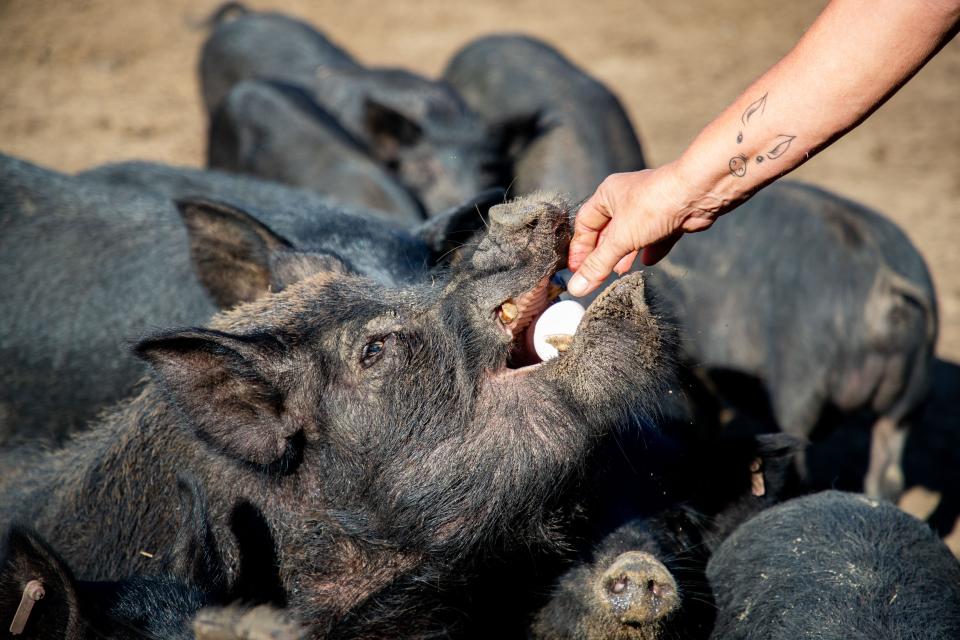
Raising an ancient breed
After a divorce, Kelly and a new partner shifted their “point of view” for the farm. Instead of only doing animal rescue, it seemed that the animals might serve a different purpose— and a healthy one.
It was then that Kelly began to branch out and into the preservation and popularization of the nearly extinct ancient American breed of “lard pigs” called Guinea Hogs.
“They’re called lard pigs because during Thomas Jefferson’s time they were used for lard and for candle wax. Now, of course, they’re sought after for their exceptional meat," Kelly said.
"They don’t grow fast, nor get as huge as other breeds, but at least in my case, they are raised organically and humanely. All of these boys and girls eat grass, hay, leftover vegetables — donated by the Kearney Center, and 500,000 pounds a year of dry spent grain, donated by Proof Brewery,” Kelly said. Minerals and soy she adds from a feed mill in Georgia.
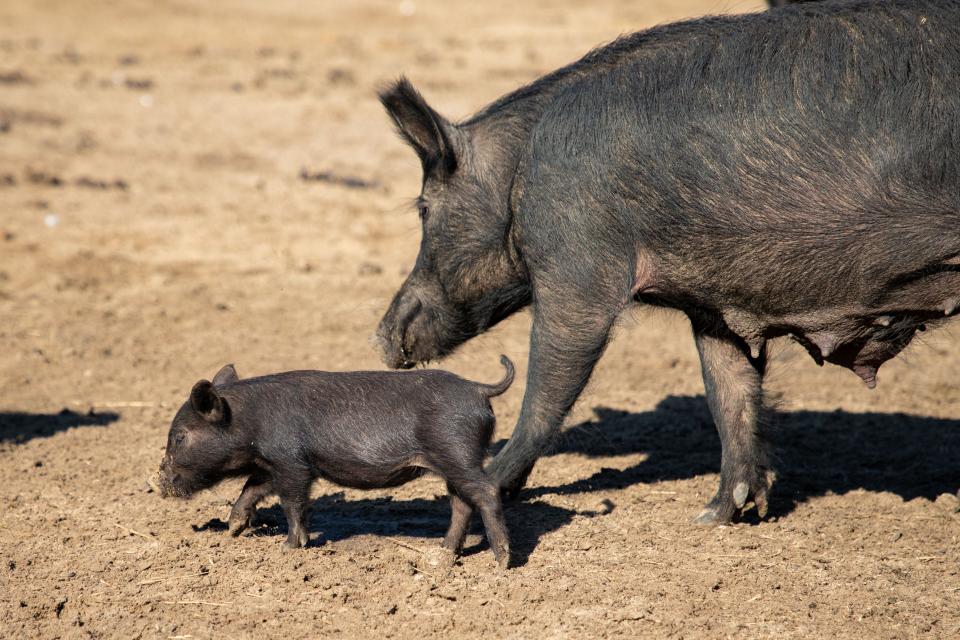
Coping with cancer, working the land
Life was busy and joyful — and then Kelly got cancer. “It was head and neck cancer. Brutal. Seventy-two radiation treatments. Two months of chemo. I had a feeding tube, a port for medications… a deep vein thrombosis… all tucked in between two total knee replacements. It was no picnic,” she says.
But it did leave Kelly with the belief that eating healthy foods, the kind of food she was growing on her farm was the way to give her body — and those of others — the best chance to fight.
There was something else that was sustaining.
“The relationships that develop when you’re working the land or raising animals are unique too,” says Kelly. Bartering, for instance, is a way of life among other farmers. “I may trade castration services for eggs, vegetables, or even ammunition,” she laughs.
She also eagerly mentors other farmers just getting to know the ways of the American Guinea Hog, whose numbers have risen in the last 10 years from a nearly extinct 12 to now, 7,000.
Sausage online and at farmers market
Lucky too, since 2018, she says, her pork, under the name, “Hurricane Creek Farms” is regularly sold out at Red Hills Online and at the Tallahassee Farmers’ Market.
Though Kelly did provide meat to restaurants, today she says prices dictate she must sell her pork retail. Karen Goodlett, former manager of Red Hills Online Farmers Market, where customers place online orders and have meat and produce delivered to their doors, says that “I’m so glad I got to see Lorri at the beginning and how her clientele has grown.”
She remembers Kelly sitting on the steps with a tiny braiser, handing out samples of sausage. “My husband still says it’s the best he’s ever eaten!”
Just then, Big Daddy, a 200-pound boar with meerschaum tusks, steps over five or six tiny, dawdling piglets, and waddles up to Kelly. “Oh, alright, you want a treat?” she says. Kelly heads for the fenced chicken yard — fenced, because “Ziva likes it that way.”
She’s speaking of one of the hip-height Turkish Kangal dogs who runs the barnyard like a benevolent warden.
“We have coyotes, bobcats, the occasional wild hog, and maybe even big cats,” she says referring to a possible Florida panther. “Ziva will stay and watch over even a tiny stray duck who got left behind the flock.” She looks into the dog’s eyes with gratitude before she goes to get an egg for Big Daddy.
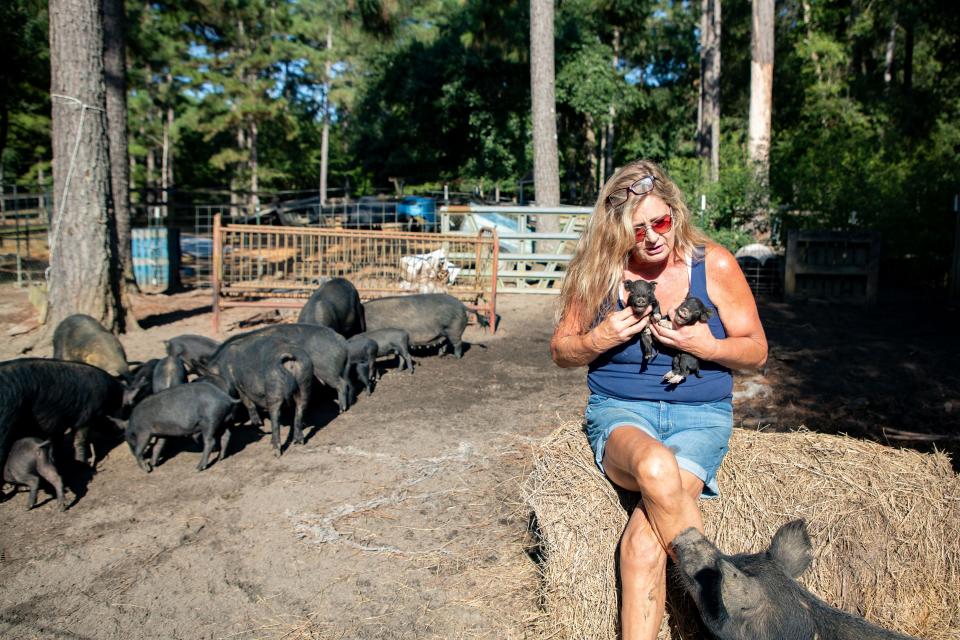
Treats and goodbyes
A few seconds later she is insisting, “Sit up. Come on, sit up!” Kelly urges the mammoth pig to rise as she holds an egg a foot over the its nose. And as a sea of hairy black bodies circles him, their own gazes fixed on the egg, Big Daddy snorts, opens a mouth redolent of the Pleistocene, and rears up to snatch a glistening ivory egg.
Kelly surveys her realm and acknowledges that this life, this life among animals who are also friends, is all she needs.
She will castrate the little piglets; breed the older ones. She has learned to skin a hog, and even dispatch baby piglets who cannot survive. She can load a steer into a trailer —often at the risk of life and limb — and haul food, water, and wallow at all hours of the day.
And with the true understanding of the cycle of life, she can say goodbye to those she has raised and nurtured without grieving.
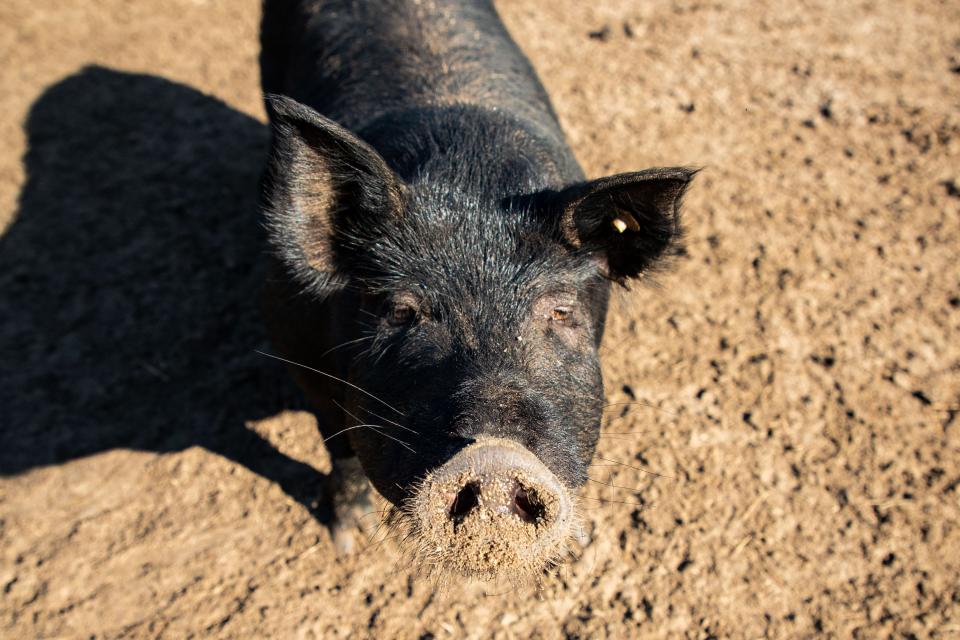
“It’s good to know that my neighbors love my animals too,” she says. “Some have even bought piglets and are raising their own. Occasionally, when someone slips through the fences, I’ll get a call that, “A little delinquent just escaped.” We’re a neighborhood,” she says, “everyone looking out for everyone else.”
Now, as the afternoon sun gives way to shadows and a light breeze picks up, Kelly takes a few more minutes before the evening chores begin to scratch three or four dogs who surround her like knights, admire a cackling goose with an elegantly arched neck, and laugh at a newborn piglet whose tiny squeaks sound like a kitty or a bird.
Who wouldn’t want to own a pig farm? Different species, sizes, destinies, yet these animals and the farmer who tends them seem to love each other. It all seems so easy here in the shade on the best kind of animal farm.
Marina Brown can be contacted at: mcdb100@comcast.net
Never miss a story: Subscribe to the Tallahassee Democrat using the link at the top of the page.
This article originally appeared on Tallahassee Democrat: American Guinea Hogs: Havana farmer makes a new life

